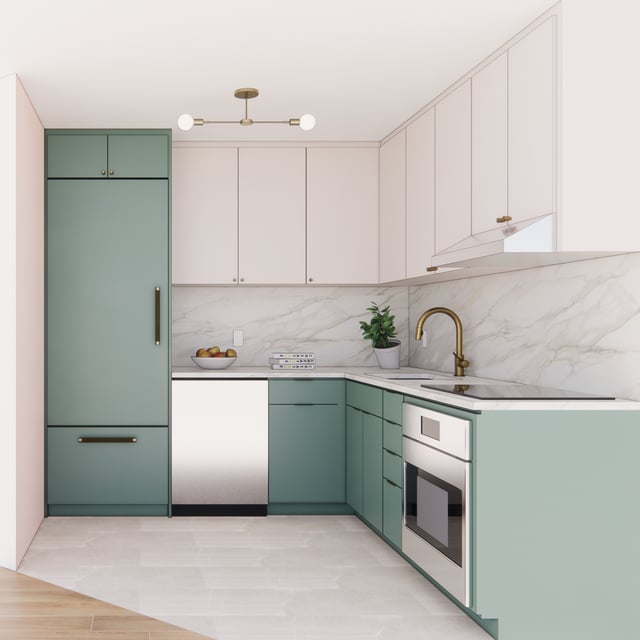
Kitchen
Rounded Kitchen Islands - Tips for Your Kitchen Layout
02.19.2026


In This Article
Remodeling a kitchen in Westchester County isn’t just a design project—it’s a local puzzle. The homes here span centuries and styles, from tight co-ops with strict building boards to expansive colonials with outdated systems hiding behind the walls. Add in town-specific permitting rules and a contractor market that’s always in demand, and the process becomes more layered than you might expect.
Design a Home That’s Uniquely Yours
Block can help you achieve your renovation goals and bring your dream remodel to life with price assurance and expert support.
Get Started
It’s not impossible—far from it. However, it requires more than just a vision board and a good Pinterest algorithm. You need the right plan, the right team, and a working knowledge of how things actually get done around here.
In this guide, we’ll walk through what makes Westchester a renovation market all its own, what kind of investment you can expect, and how to take on your project without losing momentum.
Remodeling a kitchen in Westchester is a significant investment, and for good reason. The average project starts around $25,000, but depending on your home, your choices, and the scope of the work, costs can easily exceed $75,000. That wide range reflects the complexity of renovating in a region where no two kitchens or towns are alike.
Older homes are part of the charm here, but they come with quirks: out-of-date wiring, uneven floors, surprises behind every wall. The layout of your kitchen plays a role, too. A small, straightforward update in a White Plains co-op will land differently than a full reconfiguration in a 1930s colonial in Scarsdale. Changing the footprint or moving plumbing isn’t just a design decision—it reshapes the labor, the timeline, and the permitting process.
Material choices can stretch your budget—or help anchor it. Custom cabinetry, marble countertops, and high-end fixtures can add impact, but they also add cost. Plenty of mid-range options offer durability and a timeless look without pushing the budget to the brink. The key is knowing where upgrades will enhance function or longevity, and where a simpler choice will still serve you well.
Labor is another major line item, and it reflects both the region’s high cost of living and the expertise required to do this kind of work well. Contractors familiar with Westchester’s permitting landscape and architectural styles often charge a premium but know how to avoid costly missteps.
Speaking of permits, they’re not optional. Most towns require approvals for electrical, plumbing, or structural changes, and if you’re in a co-op or condo, board approvals can add another layer of timing and paperwork. These costs vary but should always be part of your initial planning.
Finally, expect the unexpected. Once walls come down, it’s common to discover something that needs immediate attention—water damage, old wiring, hidden structural issues. A 10–20% contingency is less of a cushion and more of a safety net.
When you understand what drives the numbers—and plan accordingly—you’re in a much better position to make smart, confident decisions, not just for your budget, but for how your kitchen will function and feel for years to come.
Turn your renovation vision into reality
Get matched with trusted contractors and start your renovation today!
Find a Contractor
Starting a kitchen remodel often brings a mix of excitement and hesitation. You’re about to transform one of your home's most used—and most personal—spaces. And while the process may feel like a maze at first, breaking it down into a series of clear steps makes it not just manageable, but genuinely rewarding. Whether you're gutting the entire space or making targeted upgrades, what you do early on will shape the experience from start to finish.
Before you dive into materials or reach out to professionals, pause. Take stock. What’s driving this renovation? Maybe your kitchen doesn’t flow. Maybe storage is a daily battle. Or maybe you’re just ready for a space that feels like it belongs in this decade. Be specific. Write down what’s not working—and what you wish existed.
Then, split that list in two: needs versus wants. That simple exercise will give you clarity once numbers enter the conversation. Speaking of which, set a realistic budget. Not your stretch goal—the number you’re actually comfortable spending, plus a 10–20% buffer for the inevitable surprises. Because they will come.
From there, gather inspiration—photos, finishes, ideas that resonate with how you live. You don’t need a finished mood board, but having a visual language helps designers and contractors understand your taste and priorities. This is the time to start shaping a vision, without locking yourself into every detail.
Westchester isn’t a one-size-fits-all kind of place. Permitting rules change from town to town, and what’s allowed in Hastings might hit a roadblock in Pelham. So, before anyone swings a hammer, get clear on what’s required where you live.
Contact your town or village building department to determine which permits your project needs. Electrical and plumbing are standard. Structural changes? That’ll likely require a building permit, too. And if you’re in a condo or co-op, add board approval to the checklist—it can be its own process entirely.
Permits don’t just add paperwork; they add time. Approval can take weeks or months, depending on the scope of work and how responsive your municipality is. Build that into your schedule, and lean on professionals who understand how to navigate the system. It’s not the most exciting step, but one of the most important. It sets the tone for everything that follows.
The people you hire will shape every part of your renovation—how smoothly it runs, how well it’s built, and how close the result comes to your vision. So it’s worth taking your time here.
Start by finding licensed, insured contractors who’ve worked in Westchester before. Better yet, look for ones familiar with homes like yours—older properties come with quirks. Ask neighbors for referrals, dig into portfolios, and don’t just skim online reviews. Call a few past clients. You’re not just checking boxes—you’re looking for someone who communicates well, sticks to timelines, and doesn’t disappear when issues pop up.
And while it’s technically possible to go it alone design-wise, most homeowners are better off hiring an interior designer or architect. The right pro can help translate your ideas into a layout that works—and steer you away from expensive mistakes before they happen.
Get at least two or three quotes. Then go beyond the number. Look closely at what’s included, what’s not, and how each team approaches the work. A lower estimate might leave out details that’ll cost you later.
This is where your kitchen starts to come to life—on paper, at least. You’ll move from general ideas to concrete decisions: floor plans, cabinet layouts, materials, finishes. It’s creative work, but it’s also deeply strategic.
The best designs balance beauty with function. Think about how you move through your kitchen—where you prep, cook, unload groceries, or chat with your kids while making coffee. Storage, appliance placement, lighting, and sightlines—each choice should support how you live, not just what looks good in a rendering.
This is also the perfect moment to factor in energy efficiency. If you’re replacing appliances or lighting anyway, opt for ENERGY STAR models, LED fixtures, and smart insulation. These upgrades often pay for themselves over time, and they don’t have to come at the expense of your style or budget.
Planning well here means fewer regrets later. Take your time, ask questions, and build something that works as well as it looks.
Most kitchen remodels in Westchester take about 6 to 12 weeks once construction begins—but that’s just one chapter in a much longer process. From the first design conversation to the final inspection, plan for three to six months, depending on the scope and how long permitting takes.
Before demo day, there’s some prep involved. You may need to clear a path for crews, pack up dishes, or set up a temporary kitchen in another part of the house. If it’s a major gut, moving out for a bit might even be the path of least resistance. Your contractor can help you figure out what’s realistic based on your day-to-day life and how disruptive the work will be.
It helps to set clear milestones early on. Weekly check-ins—whether that’s a quick site visit or a standing Friday email—keep everyone aligned, and help you stay engaged without micromanaging the process.
This is where things get real. Construction usually starts with demolition—cabinets come out, floors come up, and walls may come down. It’s messy and loud, but also strangely satisfying. The space you’ve been imagining suddenly exists… even if it’s covered in dust.
Once demo wraps, the behind-the-scenes work begins. Plumbing and electrical get rerouted. Framing and drywall go up. Then the layers start coming together—flooring, cabinetry, countertops, backsplash, lighting, and appliances. This is when your kitchen begins to look like a kitchen again.
Don’t be surprised if you find yourself stopping by more often. Watching it all take shape is exciting, but it’s also smart. You’ll have walkthrough opportunities along the way, and they’re worth doing. A cabinet alignment issue is much easier to fix now than after unpacking the plates.
As construction winds down, the finish line comes into view. But before calling it done, there are a few final steps.
Depending on your location, you may need plumbing, electrical, or general building compliance inspections. Your contractor or architect should coordinate these, but it’s worth staying looped in to make sure they happen on time.
Then comes the punch list—a final walkthrough where you’ll note anything that needs adjusting, repairing, or refining. Maybe a door doesn’t close flush, or a wall needs another coat of paint. These small details matter, and this is your moment to speak up.
Before signing off, ask for any warranties, product manuals, or care guides for your new materials and appliances. You’ve invested time, energy, and money into this space—learning how to care for it is worth learning.
The renovation may be finished, but this is the beginning of something new: a kitchen that fits your life, your habits, and your home, exactly the way it should.
Renovate with confidence every step of the way
Step 1: Personalize Your Renovation Plan
Step 2: Receive Quotes from Trusted Contractors
Step 3: Let Us Handle the Project Details

Even the most carefully planned remodel will hit a few bumps—that’s just the nature of working behind old walls. But the more prepared you are, the better you navigate the twists.
Start by setting the tone with your contractor. Be clear about how you’d like to communicate, and stick to a rhythm. Weekly check-ins, even quick ones, keep things moving and catch small issues before they become big ones.
Set aside a contingency budget. In Westchester, with its century-old wiring and surprise plumbing quirks, a 10–20% buffer isn’t overly cautious—it’s realistic.
Plan ahead if your kitchen will be out of commission for a stretch. Maybe that means a folding table with a hot plate and a borrowed mini fridge. It’s not ideal, but it’ll keep you out of takeout purgatory. And don’t ignore the calendar. Contractors tend to be booked less in winter, and flexibility can sometimes lead to savings or simply less waiting.
A smart kitchen remodel isn’t about cutting corners—it’s about knowing which corners can be cut without compromising the whole. Start with what’s already working. If your cabinet layout makes sense and the frames are sturdy, refacing the doors can give you an entirely new look without the cost of a full tear-out.
Materials matter, but mid-range often wins. A well-made quartz countertop can outlast high-maintenance marble. A clean-lined stock cabinet may be just as functional as a custom one, at a fraction of the price.
If you’re up for it, consider doing some of the prep yourself. Removing the old backsplash and clearing out cabinets—these small efforts can add up to noticeable savings.
And when in doubt, spend where it counts. Good lighting, smart storage, and efficient appliances will pay off in daily life, not just resale. Focus your dollars on the things you’ll use every single day.
Transparent Pricing You Can Trust

No one sets out to make mistakes during a remodel, but in the flurry of decisions and deadlines, it’s easy to miss something that matters.
Skipping permits? It might seem harmless, especially for “minor” work—but it’s a shortcut that can cost you later. Fines, delays, and resale headaches. It’s not worth the gamble.
Budget missteps are another big one. It’s tempting to focus on the upfront quote, but renovation costs can multiply. Materials, labor, surprises—they add up fast. Build in a cushion, and keep tabs as you go.
Then there’s the allure of aesthetics. Beautiful finishes are tempting, but don’t lose sight of function. A gorgeous pendant light won’t compensate for a cramped layout or counter space.
And above all, take the time to vet your contractor. Look beyond the number. Ask questions. Call references. You want someone who shows up when they say they will—and doesn’t vanish when the drywall dust settles.
Remodeling a kitchen in Westchester is no small undertaking, but with the right plan and people, it’s more than doable. Start by getting clear on what you want and what you can spend. Learn the local rules, assemble a team you trust, and stay engaged as the project unfolds. Every step, from early sketches to final touch-ups, moves you closer to a space that actually works for the life you live now.
It’s normal to feel a little overwhelmed in the beginning. But you’re not expected to do it all alone. With thoughtful planning and the right support, the process becomes less stressful and more about momentum.
If you’re ready to get started, use Block to connect with local experts and request estimates.

Written by Block Renovation
How much does a kitchen remodel typically cost in Westchester County?
Do I need a permit for a kitchen remodel in Westchester?
How long does a full kitchen renovation take from start to finish?
What should I look for when hiring a kitchen remodel contractor?
How can I save money on my kitchen remodel without sacrificing quality?

Renovate confidently with Block
Easily compare quotes from top quality contractors, and get peace of mind with warranty & price protections.
Thousands of homeowners have renovated with Block

4.5 Stars (100+)

4.7 Stars (100+)

4.5 Stars (75+)

Kitchen
Rounded Kitchen Islands - Tips for Your Kitchen Layout
02.19.2026

Kitchen
Upscale Kitchen Appliance Brands That Add a Touch of Luxury
02.13.2026

Kitchen
Non-Tile Kitchen Backsplashes: Alternative Ideas
02.12.2026

Cost
Ceiling Installation Costs: Repairs & Replacement Pricing
02.12.2026
.png?width=640&name=u5821215421_ndustrial_loft_kitchen_with_exposed_steel_beams_m_2ee82435-dc1f-4c66-b21b-878cad8b5359_3%20(1).png)
Kitchen
Mixing Metals in the Kitchen: a Guide to Getting it Right
02.02.2026
Renovate confidently